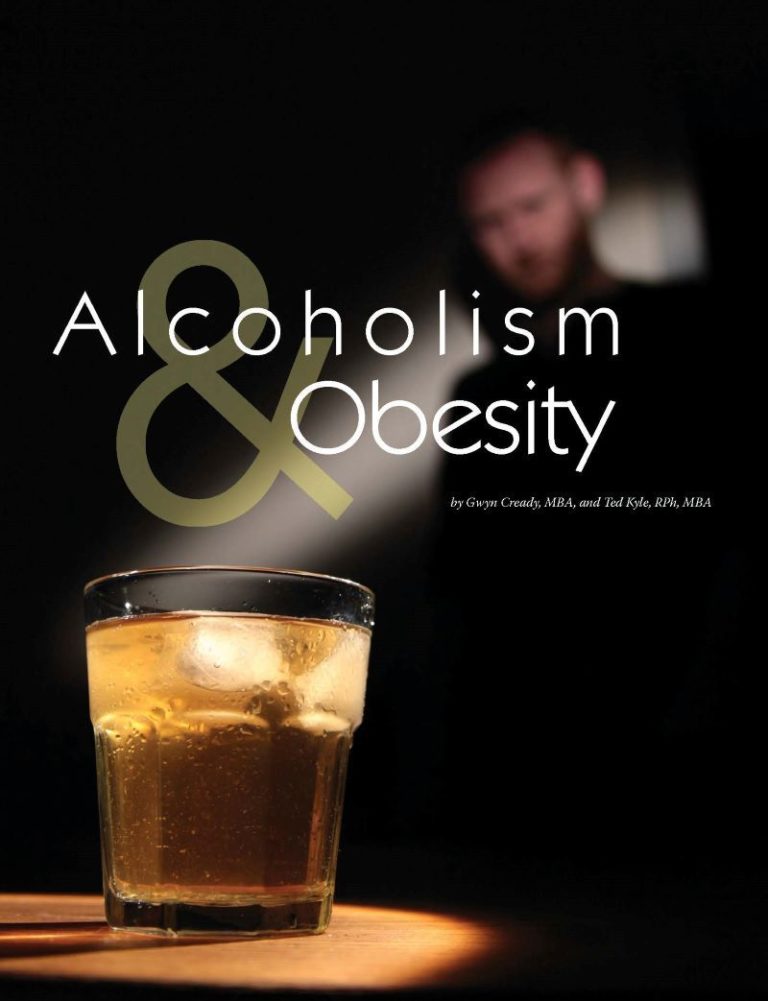Alcoholism & Obesity


by Gwyn Cready, MBA, and Ted Kyle, RPh, MBA
Winter 2012
What condition involves too much consumption of caloric substances, affects millions of Americans, and is often considered to be a failure of willpower, but now has been shown to have strong environmental and genetic links? The answer is obesity; however, the answer is also alcoholism.
Alcoholism and obesity may be more related than we realize. Both conditions are occasioned by periods of loss of control, whether that loss of control is the result of a moment of personal weakness, genetics or the environment. People with these conditions spend a lot of time preoccupied with managing their addiction, whether it is struggling to maintain control, feeling guilty or planning how and when they will next access alcohol or food. Both conditions can grow progressively worse and both conditions, taken to an extreme, can be fatal.
Part of what makes alcoholism and obesity alike is the way the tools of the disease, ethanol and food, work on the brain. Ethanol stimulates reward centers in the brain in much the same way sugar, salt and fat do. Because of this, people with a predisposition to over-drinking may also have a predisposition to overeating.
Alcohol and Weight-loss
Some people have said that drinking alcohol increases appetite, and so can lead to overeating and weight gain. Ethanol, the kind of alcohol in alcoholic drinks, and fat from foods have approximately the same amount of calories; but people with alcoholism tend not to be affected by obesity, mainly because they are often malnourished, having replaced a portion of their food calories with calories from alcohol. Some turn to alcohol, just as others turn to cigarettes or drugs, as a way to replace the comfort they find in food.
A 2005 study looked at people who drank alcoholic drinks regularly. It showed that people who drank the smallest amount (one drink per day) with the greatest frequency (three to seven days per week) had a lower body mass index (BMI) than those who drank more infrequently, but in larger amounts. While we can’t claim a cause and effect from the results, they may show a relationship between over-drinking and overeating.
In addition, a small study of 14 men who added two glasses of red wine to their evening meal every day for 12 weeks, showed no measured effect on the weight, body fat or calorie intake of the men involved. While both studies suggest that moderate drinking (one to two drinks per day) is not associated with higher BMI, it is not a good idea for those interested in losing weight to turn to alcohol as a replacement for food. This trade-off is an unhealthy one, and those interested in losing weight would be better off focusing on their current condition instead of trading one for another.
A Growing Link between Alcoholism and Obesity
Researchers at the Washington University School of Medicine in St. Louis published one of the most important studies done regarding the link between obesity and alcoholism in early 2011. They looked at data from two large alcoholism surveys. The first, the National Longitudinal Alcohol Epidemiologic Survey, was conducted in 1991-1992. The second, the National Epidemiologic Survey on Alcohol and Related Conditions, was conducted in 2001-2002. In all, 80,000 people took part in the two surveys.
After controlling for other factors, the researchers found that in the more recent survey, people with a family history of alcoholism had a greater chance of being affected by obesity. For women, who had a 49 percent greater chance, this was especially true. One possible explanation is that in trying to avoid the alcoholic behaviors observed in their families, people replace alcohol with a different addiction.
What surprised researchers, however, was that there was no link between obesity and a family history of alcoholism in the first survey. The fact that the link strengthened as much as it did in the relatively short amount of time between the two surveys suggests that environmental factors (the increase in sedentary times; the increased prevalence of fatty, sugary and salty foods in grocery stores and restaurants; and the reduced access to opportunities for activity) are involved. In short, a genetic risk might be subdued in a world that makes maintaining one’s weight a relatively straightforward task. But, change the environment to make unhealthy eating easier and being active harder, and the problem will become apparent.
The researchers’ comments in their publication in the Archives of General Psychiatry are telling. They focused on changes to our food environment, suggesting that obesity may be rising in “individuals vulnerable to addiction. This may be specifically the result of a changing food environment and the increased availability of highly palatable foods.”
Overlapping Brain Pathways
More and more, neuroscientists are finding similarities in the pathways that lead to excessive eating and dependence on alcohol and other drugs. Both obesity and alcohol addiction have been linked to the brain’s reward system. Overconsumption can trigger a gradual increase in the reward threshold, requiring more and more palatable high-fat food or reinforcing alcohol to satisfy cravings.
The National Institutes of Health (NIH) researchers have recently found that exposure to high-fat foods can trigger addictive responses in animals and cause obesity. Dr. Nora Volkow, the director of the National Institute for Drug Abuse, said, “Addiction and obesity are two of the most challenging health problems in the United States. This research opens the door for us to apply some of the knowledge we have gathered about addiction to the study of overeating and obesity.”
Likewise, researchers at the University of North Carolina at Chapel Hill have recently shown that a brain protein called neuropeptide-Y regulates alcohol use, as well as appetite and food consumption. According to Dr. Todd Thiele, “Every day we are learning more about how eating and drinking are inextricably linked at the physiologic level. These physiologic commonalities help to explain why the behaviors of excessive food intake and excessive alcohol consumption share so many similarities.”
Conclusion
The facts emerging in the scientific world suggest there is a link between obesity and alcoholism. Much work to untangle that link and use it to understand, treat and prevent the two diseases lies ahead.
About the Authors:
Gwyn Cready, MBA, is a communications consultant with more than 20 years of healthcare policy and brand marketing expertise, as well as an award-winning romance novelist.
Ted Kyle, RPh, MBA, is a pharmacist and health marketing expert and is also a member of the OAC National Board of Directors.
by Robyn Pashby, PhD Winter 2024 “No one is ever going to date you if you don’t…
Read Articleby Nina Crowley, PhD, RD (with Inspiration from Shawn Cochran) Winter 2024 Dating, no matter your age,…
Read Articleby Leslie M. Golden, MD, MPH, ABOM Diplomate Winter 2024 The journey to overcoming obesity is a…
Read Article







